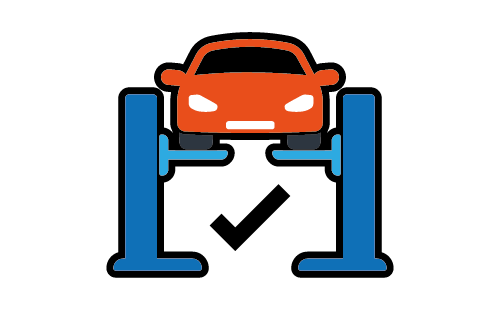Car tax check
Find out if your car is taxed using our FREE car tax check tool.


How to check if your car is taxed
The easiest way to find out whether your vehicle is taxed is by entering its registration number into the car tax check tool above. (After you have paid your road tax, it may take up to five working days for the online tax records for your vehicle to update.)
You should also receive a V11 reminder form on the 5th day of the month before your road tax renewal is due. You can find your road tax expiry date in Section 1 of this document.
How do I tax my car?
You can tax your vehicle online via the gov.uk website. To do this, you will need the reference number from your V11 reminder document, V5C logbook - or the green ‘new keeper’ slip (if you have recently purchased the car).
-
You can pay for your road tax by setting up a Direct Debit online or at a Post Office.
-
You can cover the full annual cost in one payment at a cheaper rate.
-
You can also choose to pay in 6-monthly or monthly instalments. (A 5% surcharge will be applied.)
Why should I check my vehicle’s tax status?
It is against the law to drive a car without road tax (with a few exceptions) - and it is your responsibility as a driver to ensure your vehicle is taxed.
The amount you’ll pay will depend on which category your car falls into. There are different VED (Vehicle Excise Duty) bands for petrol, diesel and electric cars.
Your car’s tax band and annual tax rate will depend on a variety of factors such as when it was first registered and its CO2 emission levels (or in some cases, its engine size).
Frequently asked questions
To find out how car tax bands work and which one will apply to your motor at its next renewal, visit our guide 'UK car tax bands explained'.
Please note: Car tax bands are subject to change. You should always check the gov.uk website for the latest information.
Fully electric cars are not currently subject to car tax as they do not produce CO2 emissions. However, bear in mind that it is still your responsibility to register your car for road tax, even if it is exempt.
From April 1st 2025 onwards, owners of newly-registered electric cars will have to pay a lower rate of £10 for the first year, then the standard road tax rate will be charged each year thereafter.
The DVLA runs monthly checks on all cars registered in the UK.
If your car does not have a Statutory Off-road Notification (SORN) and is untaxed, an automated £80 fine will be sent to the registered keeper’s address. If you fail to pay this, you could face a penalty of up to £1,000. The DVLA also has the power to clamp your car until the tax has been paid.
There is only one scenario where driving without tax is permissible: if you are traveling to a pre-booked MOT test. (You may be asked to provide evidence of your appointment if you are pulled over by the police.)
If your car was registered before 1st March 2001, your road tax will be calculated based on your engine size. For a car registered after this date, the tax will be calculated based on its CO2 emissions and fuel type.
If you cancel your car tax, you will automatically receive a refund for any full months’ outstanding cover. This is calculated from the date your information was registered, and you should receive the payment within 10 working days.
If your vehicle qualifies for car tax exemption, you will still need to apply to tax it, but no charge will be applied. Vehicles that are exempt from car tax include:
- All fully electric vehicles (until 1st April 2025).
- Disabled passenger vehicles.
- Many classic cars over 40 years old.
- Cars registered from 1st March 2001 (but before 1st April 2017) that produce no more than 100 g/km of CO2.
- Vehicles with a SORN.
- Mowing machines, steam vehicles and vehicles used for agriculture, horticulture and forestry.
Some disabled drivers are eligible for a 50% discount on their car tax - and those in receipt of certain disability benefits are eligible for full car tax exemption.
Visit our guide ‘UK car tax bands explained’ for a comprehensive list of car tax exemptions.
You can check when your car tax expires using our free car tax check tool. Enter your reg number at the top of the page to get started.
Some cars have free road tax, but even if your vehicle is tax exempt, you will still need to register it via the gov.uk website.
Road tax must be renewed every year, regardless of whether your vehicle is tax exempt.
- You can pay by credit or debit card - or by Direct Debit.
- If you choose to pay by Direct Debit, your vehicle tax will automatically be renewed when it is due. (You should also receive an email or letter notifying you when payment will be taken.)
- You can choose to pay annually, on a 6-monthly or monthly basis. (A 5% surcharge will be applied if you have chosen to pay on a 6-monthly or monthly basis.)
You do not have to pay road tax if you own:
- A used car registered between 1st March 2001 and 31st March 2017 that emits less than 100g/km of CO2, you won’t have to pay any road tax.
- A fully electric car (this includes vehicles that underwent electric car conversion).
- A vehicle with classic car tax exemption.
Some newer hybrid and alternative fuel cars (such as bioethanol and LPG cars) with CO2 emissions levels no greater than 50 g/km are also exempt from the first year ‘showroom’ tax. (However, the standard car tax rate will be applied from year 2 onwards.)
To find out when your vehicle tax is due, use our free car tax checker. Once you’ve entered your vehicle’s registration number, our tool will tell you your car’s tax status and when it is due to expire.
You cannot check your car’s tax status by VIN number. To check a vehicle’s tax status, you’ll need its reg number. You also use the 11-digit reference number in your V5C logbook to check your vehicle’s car tax band.
Are you trying to identify a missing registration number? Visit our guide ‘Find a registration number from VIN’ for tips and insights.






